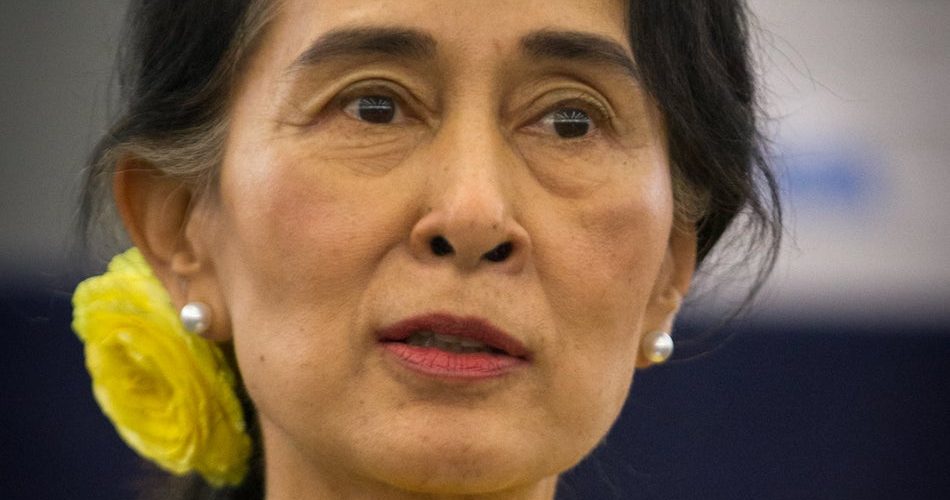1991 Nobel Peace Prize Winner
Note: Controversy currently surrounds Aung San Suu Kyi’s failure to publicly condemn the military’s campaign of ethnic cleansing against Rohingya Muslims. As Myanmar’s civilian leader, Suu Kyi has no authority over Myanmar’s military. Nontheless, international leaders, including other Nobel Peace Prize laureates, have called on Suu Kyi to take a public stand on the crisis.
As to questions about revoking her 1991 Nobel Peace Prize for failing to speak out, The New York Times has reported that the Nobel Committee has never revoked a prize nor censured a recipient. Gunnar Stalsett, a former committee member, is quoted in The New York Times as saying, “The principle we follow is the decision is not a declaration of a saint. When the decision has been made and the award has been given, that ends the responsibility of the committee.”
Aung San Suu Kyi (pronounced Ahn Sahn Soo Chee) was born June 19, 1945, in Rangoon, Burma (also known as Yangon, Myanmar). Suu Kyi’s family valued freedom and diplomacy. Her father, General Aung San, helped negotiate Burma’s independence from Britain. Political rivals killed him in July 1947. Her mother, Ma Khin Kyi, became Burma’s ambassador to India in 1960.
Suu Kyi spent her childhood in Burma and India. India had gained independence from Britain in 1947 thanks to the leadership of Mahatma Gandhi. Gandhi’s philosophy and his success helped shape Suu Kyi’s faith in the power of nonviolent resistance.
In 1962, Burma’s military took control of the government. Two years later, Suu Kyi moved to England to attend Oxford University. She studied philosophy, politics, and economics. It was here she met her future husband, Michael Aris. Suu Kyi worked at the United Nations (UN) after earning her college degree in 1967. At the UN, she served as the assistant secretary for the Advisory Committee on Administrative and Budgetary Questions. Suu Kyi later settled in England, where she and her husband raised their two children.
Suu Kyi returned to Burma in April 1988 to care for her sick mother. By this time, Burmese citizens had started rising up against the brutal and corrupt military regime. In August, Burma’s army killed thousands of peaceful, pro-democracy protestors. Suu Kyi wrote a letter asking the government to hold multiparty elections. She then gave a speech calling for a multiparty, democratic-style of government. In September, Suu Kyi co-founded the National League of Democracy (NLD). The NLD planned to use nonviolence and civil disobedience to change the government.
Suu Kyi’s political activity and popularity threatened the government, which changed the country’s name to Myanmar in 1989. Her call for democratic reform and multiparty elections were met with harsh punishment. Between 1989 and 2010, Suu Kyi was in and out of house arrest for a total of 15 years. Within a year of her first house arrest, the government decided to hold multiparty elections. However, when the NLD won most of the legislative seats, the military rulers refused to give up control of the government.
People around the world recognized Suu Kyi for her work to bring justice and peace to Burma. For her nonviolent efforts, she received several awards, including the 1991 Nobel Peace Prize. Because she was under house arrest, she could not accept the awards in person.
While under house arrest, Suu Kyi saw few, if any, visitors. Although able to meet with NLD officials and select diplomats, she was not allowed see her husband or two sons. When cancer threatened her husband’s life, government officials said she could go to England to visit him. Suu Kyi was reluctant to leave because she feared she would not be allowed to return. Her husband died on March 27, 1999.
Suu Kyi was released from house arrest for the last time in November 2010. Burma did not hold another multiparty election until 2012. This time, Suu Kyi won a seat in Parliament, and the government accepted the results. That same year, Suu Kyi traveled to Oslo, Norway, to accept the Nobel Peace Prize she had received 21 years earlier.
Multiparty elections held in 2015 gave the NLD control of Burma’s Parliament. This victory may give Suu Kyi, the NLD, and the people of Burma a chance to form a new, civilian government.
References
“Aung San Suu Kyi defends Myanmar’s reaction to Rohingya Muslim crisis.” (19 September (2017). NPR online. Retrieved from npr.org/2017/09/19/552006611/aung-san-suu-kyi-defends-myanmars-reaction-to-rohingya-muslim-crisis
“Aung San Suu Kyi fast facts.” (17 November 2015). CNN online. Retrieved from cnn.com/2013/01/18/world/asia/aung-san-suu-kyi-fast-facts/
Buncombe, A. (27 October 2017). “Rohingya crisis: Death toll of Muslims killed by Burmese army ‘may be extremely high,’ says UN.” The Independent. Retrieved from independent.co.uk/news/world/asia/rohingya-crisis-death-toll-burma-army-rakhine-muslims-un-myanmar-a8022931.html
“Burma’s pro-democracy leader Aung San Suu Kyi released after 15 years house arrest.” (14 November 2010). Daily Mail. Retrieved from dailymail.co.uk/news/article-1329375/Burmas-Aung-San-Suu-Kyi-free-15-year-house-arrest.html
Gladstone, R. (26 October 2017). “‘Baffled’ by Rohingya stance, U.N. official scolds Aung San Suu Kyi.” The New York Times. Retrieved from nytimes.com/2017/10/26/world/asia/myanmar-rohingya-aung-san-suu-kyi.html
Goldman, R. (4 September 2017). “Why Aung San Suu Kyi’s Nobel Peace Prize won’t be revoked.” The New York Times. Retrieved from nytimes.com/2017/09/04/world/asia/myanmar-rohingya-suu-kyi-.html
“Myanmar’s 2015 landmark elections explained.” (3 December 2015). BBC online. Retrieved from bbc.com/news/world-asia-33547036
“Myanmar: Who are the Rohingya?” (28 September 2017). Aljazeera online. Retrieved from aljazeera.com/indepth/features/2017/08/rohingya-muslims-170831065142812.html
Nobel Peace Prize 1991. Nobelprize.org. Nobel Media AB. Retrieved from nobelprize.org/nobel_prizes/peace/laureates/1991/press.html
“On this day: Burma declares independence from Britain.” (4 January 2011). findingdulcinea.com. Retrieved from www.findingdulcinea.com/news/on-this-day/On-this-Day–Burma-Declares-Independence-from-Britain.html
Peck, G. (13 November 2015). “Suu Kyi’s party wins historic majority in Myanmar polls.” Associated Press. Retrieved from bigstory.ap.org/article/89c130d6cfc74e1286b73fd97d568836/suu-kyis-party-wins-historic-majority-myanmar-polls
“Profile: Aung San Suu Kyi.” (13 November 2015). BBC online. Retrieved from bbc.com/news/world-asia-pacific-11685977
“Should it be Burma or Myanmar?” (26 September 2007). BBC online. Retrieved from news.bbc.co.uk/2/hi/uk_news/magazine/7013943.stm
Image credit: “Aung San Suu Kyi” by Claude Truong-Ngoc is licensed under CC BY-SA 3.0.


